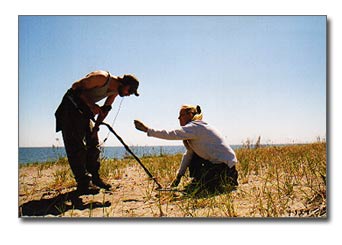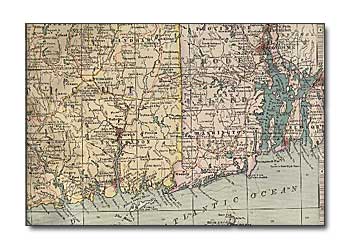Beginner Metal Detecting Tips
So... you just bought your first metal detector and you're looking for any help you can find. You came to the right place!
First, we would suggest that you join a metal detecting or treasure hunting club. You will learn a lot more, a lot quicker, from other club members then you would by yourself! You will also find new friends, share your finds, and get support for the hobby.
For some people, it's easier to hunt with a group than by yourself. If your looking for a partner you'll find one there. Most clubs will let you come as a guest. Visit several to find the right one for you. You can even join more than one if you want to. Visit RItreasure.com (Club archive) if you live in Southern New England.
Trash and Treasure
 Great finds make this hobby exciting and interesting! If every time you go out, all you find is a few pennies or just trash, more than likely, your detector is going to wind up in a closet gathering dust!
Great finds make this hobby exciting and interesting! If every time you go out, all you find is a few pennies or just trash, more than likely, your detector is going to wind up in a closet gathering dust!
When we come back from a day of detecting, probably 60 to 80% of what we have found goes right back into the trash can. However, a lot of what you find depends on where you go and how much you know about your detector.
Buying the Best Detector
All of us probably want to have the best metal detector, but many simply can't afford it, or is just starting out in the hobby, and doesn't want to spend the bucks to get the best. Of course, having the deepest machine will give you an edge over other hunters, but from our own experience, it's not that important! And how's that, you ask?
The answer is simple, by doing research and studying your local history, you will find spots that others have never hit, and most likely, the targets are only a few inches under your coil. Then once you get used to telling your signals apart, you'll be able to graduate more trashy areas that most detectorists bypass cause they don't have the patience to deal with it.
Dig Everything
The best place to use your first metal detector is on a beach, and just dig everything till you learn the different types of signals. Most detectors are built with some discrimination that helps you bypass most objects like nails, foil, pulltabs, etc. But the more you discriminate, the less depth you going to have. For example, if you discriminate against pulltabs, you'll miss the nickels or small gold rings. So be careful with it!
Don't start in an area that is so overloaded with signals it drives you crazy. Take our advice and practice on a beach or field, or even better, your own backyard.
Cleaned-out Spots
If you know of someplace that has been well hunted or overhunted, try detecting it after a big rain when the ground is soaked. The wet ground has more conductivity, and you may find deeper stuff. Also, after a hard winter, the ground shifts after it thaws, so there are now targets where there wasn't any last year when you detected there. Go back and check your old turf again.
Respect Others
Always cover your holes even on the beaches, so people that are walking or jogging don't twist their ankle, because they rarely look where they're going! Always take the trash you dig up with you. A lot of times we get home and go through our trash, and discover things we thought was junk and it wasn't.
Nosey People
Let's face it... metal detectorists get a lot of attention! It's rare that you'll be going to a place where nobody else is around. The best thing to do, when you get to a site, is to start detecting at the far end, away from the crowd. Then once people have noticed you, watched for awhile, and noticed how far away you're detecting, they'll go back to their own business, and forget about you. In other words, they'll get use to you.
Once that happens, you can edge your way closer to a crowd or to a better area. Some may even edge their way over to you, just to chat.
If you don't want to be bothered with nosey people, try starting your day early, or later after the crowds thin out, or when it's raining. We even metal detect at night every once in awhile.
Overload
Ever notice that aluminum cans give the same signal as a coin? When you pinpoint it, it says 1.5 inches, you kick away 2.0 inches of sand and it it still beeps in the hole. Common sense come into play here...it is not a coin.
The question is, do you dig up the can and discard it, or do you refill the hole and leave it because your trash pouch is already full? Listen, take extra plastic bags with you to put large trash in, then if you get stopped by the rangers on the way out you can show them how much trash you picked up. In some situations, we actually take a bag of trash in with us just to have on hand just in case.
Researching New Spots
 There are many ways of finding new spots. You don't even have to go to the library. The Internet has grown a lot for the past few years, and new sites are popping up everywhere. All you have to do is go to your favorite search engine and type "History of ..." your state, province or town and see what comes up. A little bit of reading, and you're on the way to some new spots.
There are many ways of finding new spots. You don't even have to go to the library. The Internet has grown a lot for the past few years, and new sites are popping up everywhere. All you have to do is go to your favorite search engine and type "History of ..." your state, province or town and see what comes up. A little bit of reading, and you're on the way to some new spots.
Another way is to find some old pictures or postcards. Most old postcards have a picture of a significant place, like parks, casinos, important buildings and beaches.
You can go to Ebay.com and type the name of your town or state, and I'll bet your eyes will pop out of what you going to see! This is by far our favorite way of research. But of course, if that is not enough, and you have the time, you could pay a visit to the library and dig up some old dusty books and maps.
Thanks for stopping by and reading our Beginner Metal Detecting Tips.
Also visit: Beach Hunting Tips
Cleaning your metal detecting finds
Connecticut Detecting Rules